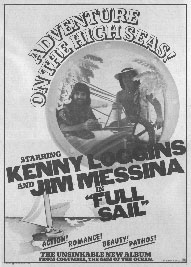![]()
  |

Full Sail
Loggins And Messina
Columbia 32540
Released: October 1973
Chart Peak: #10
Weeks Charted: 49
Certified Platinum: 11/21/86

 It has taken Jim Messina three albums to slip out of his sideman sweatshirt and don the trappings of a star, but in Full Sail, Loggins and Messina's third release, he does just that. With his confidence bolstered by gold albums, undisputed box-office success and numerous cover versions of his music by C&W, pop and soul artists, he has turned the focus of the band's attention from Kenny Loggins to himself.
It has taken Jim Messina three albums to slip out of his sideman sweatshirt and don the trappings of a star, but in Full Sail, Loggins and Messina's third release, he does just that. With his confidence bolstered by gold albums, undisputed box-office success and numerous cover versions of his music by C&W, pop and soul artists, he has turned the focus of the band's attention from Kenny Loggins to himself.
The LP is subtle and heavily influenced by the liquid sensuality of reggae, which has seeped into Messina's music just as in the early Poco days he let Latin rhythms roll through his country riffs. Although short on the snap and crackle that made the first two albums exciting, Full Sail is nevertheless their equal. On it, the band does a balancing act between AM rock and jazzier, more personal excursions.
 Click image for larger view. |
"Lahaina" and "Coming To You" are both reggaes, one tropically light-hearted, the other a sexy seance that conjures the spirit of Buddy Holly. "Didn't I Know You When" and "My Music," a couple of solid rockers, serve as a link to the Loggins and Messina of old as do Kenny's mellifluous ballads, "A Love Song" and "Watching the River Run." The extended production numbers, "Pathway To Glory" and "Sailin' The Wind," allow the band, particularly Al Garth and Jon Clarke, the chance to stretch out.
Messina pulls out all the stops for "Pathway," the album's showpiece. With a wan vocal, the best he's recorded (he gave up cigarettes for these sessions), he warns himself to beware of worldly ways. But the ghostly strains of Jon Clarke's oboe solo suck him into the mesmerizing waterfall of sound until his instrument dovetails into the pained walls of Loggins' harmonica, and then the laughing, sardonic scratchings of Al Garth's fiddle. In a revealing burst of bravado, Messina's guitar assumes command. Lacking the savagery necessary for a killing blow, the guitar plays with its quarry until, after a lovely fiddle/guitar dialogue, the band restates its initial warning and departs.
Further reading on Super Seventies RockSite!: Album Review: |
Bonus Reviews!
Once in a while it is a pleasure to be proved to your own satisfaction that you were wrong. I had written off Loggins and Messina as able but not very interesting musicians, but on this outing they are so inventive and charming that now I wonder if my radar wasn't defective, if they weren't sending out signals that I missed or ignored in their previous efforts.
This album illustrates the happy catholicity in their material, which includes delicate and tasteful strokes of jazz, folk, and soft-rock. "Lahaina" is a more successful Caribbean reggae tune than some of the genuine articles we have been exposed to lately. Maybe that is because the genuine articles have sometimes come from young Caribbean blacks who use the form as a vehicle for short-view protest where their elders used it for expressing many long-view facts of life. Loggins and Messina plump for the latter and thereby capture the joy, the savvy, and the glory of Caribbean music.
Jon Clarke and Al Garth deserve special mention for their efforts on recorder, violin, flutes, and reeds, but the whole group is obviously having a good time, unhurried and unworried. This is pleasing music made for the sake of making same, as picturesque and satisfying as a good movie. Sail on, Loggins and Messina, and keep proving me wrong in the same good way. I love it, I love it.
- Joel Vance, Stereo Review, 4/74.
Sure gold for third straight time by the crown princes of soft rock. Messina's production is as impeccable as ever, and the songs show L&M's admirable versatility, keyed by the multi-horns and violin of Al Garth and Jon Clarke. Diamond-pure sound with most cuts a potential single. "My Music," "A Love Song," and "Lahaina" are only a few of the candidates.
- Billboard, 1973.
This is every inch a followup to Loggins and Messina, including a '50s rock & roll pastiche in the style of "Your Mama Don't Dance" called "My Music" that hit #16 as a single. Other notable material included Messina's island-rock anthem "Lahaina" and one of Loggins' sensitive-but-generic ballads, typically called "A Love Song." But then, the charm of L&M was that they could get away with something this sappy. Balance is the key to L&M albums, and it's the chief talent (among many) that producer Messina brings to them. Here, as on L&M's first two albums, he achieves a musical flow that's exhilarating, and the record is only denied a "finest" rating because the quality doesn't quite match those LPs. * * *
- William Ruhlmann, The All-Music Guide to Rock, 1995.
![]() Reader's Comments
Reader's Comments
No comments so far, be the first to comment.